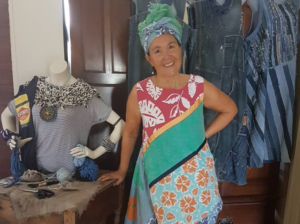Rethink waste and be empowered
Inspirational author and speaker Jane Milburn will challenge us to think differently about how we dress when she comes to Bundaberg for International Women's Day.
Ms Milburn, who is a social entrepreneur and renowned author of Slow Clothing, will headline the Zonta Club of Bundaberg's IWD Breakfast at Rowers on the River on Sunday, March 10.
She will also host workshops on Saturday, March 9.

These events will focus on how education and financial empowerment are keys to changing women's lives from the perspective of resourcefulness and creating more from less.
“Our aim as a Zonta Club is to empower women and girls of Bundaberg through inspirational activities, which is why we have invited well-known author Jane Milburn to join us for International Women’s Day,” Alex Grove said.
“Jane’s website and book puts forward a compelling case for changing our consumption habits when it comes to clothing and we expect her speech to challenge us to make those changes in our lives.”
Jane said she was looking forward to bringing the message about changing the way we dress from her book Slow Clothing to a Bundaberg audience.
“We’ve been conditioned into believing we need to buy new stuff to appear successful,” she said.
“But in the rush to own things for reasons of status and looks, we have lost the opportunity to be mindful and resourceful through the act of making and creating.
“When we think of waste as a resource not a reject, then suddenly there are opportunities all around us – in our wardrobes, op shops and tip shops.
“Instead of thinking a hole in your jumper is a reason to toss it and buy new, we can rethink mending as an opportunity for upcycling and creative reuse of natural resources.”
Zonta Bundaberg aims to help women become financially independent and that can involve spending less on consumption, rather than earning more, as part of the broader ecological need to manage waste and reduce the demand on natural resources.
“We hope to see plenty of members of the Bundaberg Community join us at the breakfast and the workshops,” Alex said.
As well as the speech, breakfast attendees will enjoy a hot meal, a glass of sparkling wine on arrival and a number of great raffles.
Tickets at $35 and available either online or you can collect tickets at Commonwealth Financial Planning, 27 Takalvan Street, Bundaberg.
Tickets for the workshop with Jane Milburn on Saturday, March 9 are $150 and are available either online or phone 0414997214.
Jane Milburn profile
Australian social entrepreneur and author Jane Milburn brings a health-and-wellbeing context to how we choose, wear and care for clothes.
Jane’s Slow Clothing book and philosophy builds on her earlier career in agricultural science, journalism and communications before establishing Textile Beat in Brisbane in 2013 as a leadership response to textile waste.
In an era dominated by passive consumption of cheap and synthetic fashion, Jane presents a compelling case for why we need to change the way we dress to live lightly on Earth through everyday practice.
Jane is Rural Women’s Award Queensland 2010 runner-up and an Australian Rural Leadership Foundation fellow.







